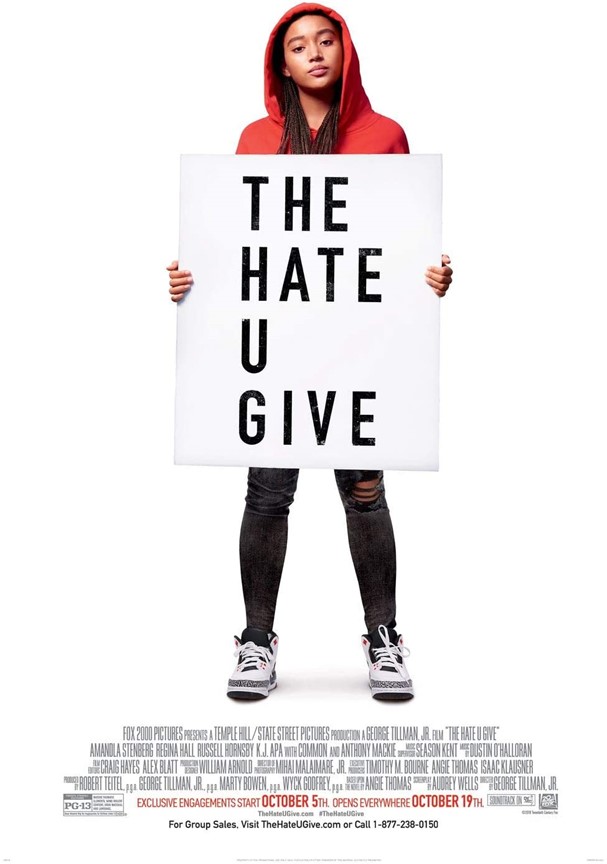Now is the time to revisit The Hate U Give
The hit 2018 movie, based on Angie Thomas’ novel, is now more relevant than ever.
Starr (Amandla Stenberg) searches for justice following the brutal killing of her friend Khalil (Algee Smith) in this 2018 hit movie.
January 23, 2022
Why would a movie from 2018 addressing police brutality and injustices that black Americans face still be relevant in early 2022? Because these issues have not gone away. Ever since May 2020, many Americans have opened their eyes to the issues addressed in The Hate U Give, making it more relevant now than ever before.
The Hate U Give discusses the importance of using your voice to fight against issues that are still prevalent today, such as white privilege, police brutality, racism, and discrimination. The movie is an adaptation of Angie Thomas’ novel of the same title, which was inspired by a short story that Thomas wrote in college about the police shooting of a man named Oscar Grant. The movie was released on September 7, 2018 and was a massive success with $34.9 million made in the box office. The movie stars Amandla Stenberg as Starr Carter, Algee Smith as Khalil Harris, and Russell Hornsby as Maverick Carter.
The movie follows Starr, a young black woman whose biggest struggle at the time was finding a balance between her life at the predominantly white private school called Williamson Prep and her neighborhood of Garden Heights, which is a predominantly black area. She constantly had to act differently depending on her surroundings. She could not act “preppy” in her neighborhood, and she could not act like she was “the poor girl from the hood” at Williamson.
After leaving a party, Starr and her childhood best friend Khalil are driving home, but they are stopped by a police officer. Tension continues to rise between the officer and Khalil, though Starr is trying her best to deescalate the situation. After following orders and getting out of the car, Khalil leans down to check on Starr, before reaching to pick up his hairbrush. The officer, thinking Khalil was going for a weapon, pulls out his gun on the unarmed teenager. After shooting and killing Khalil, the officer discovered that he was unarmed.
The killing becomes a national news story, but at first Starr attempts to remain anonymous trying to maintain the reputation she has at Williamson prep. Eventually she agrees to an interview where she defends Khalil’s character, but she ends up exposing the King Lords, the gang that controls her neighborhood. The gang retaliates by threatening Starr and her family, forcing them to move in with her uncle, who is a police detective.
When the grand jury does not indict the officer, Garden Heights demands justice for Khalil in different ways, some through peaceful protests and others through riots. Starr takes a public role, including speaking out during the protests, which causes tension with people at Williamson prep.
Everyone should watch this movie at least once. Ignoring the amazing acting and production, The Hate U Give addresses hard topics that are sometimes controversial, but it starts conversations that need to be had. The most obvious topic that is discussed is police officers killing unarmed Black Americans–specifically unarmed Black men- and not being charged. Khalil Harris’ death in the movie is heart wrenching and infuriating, which leaves the viewer to reflect on real life occurrences of similar events.
Systemic racism and discrimination are brought up throughout the movie. There’s a moment when Starr and her father talk about the meaning of THUG LIFE, (“The Hate U Give Little Infants Effs Everybody”) they talk about how the system is designed against black people, and how the cycle of poverty leads to more gangs and drugs in their neighborhoods. In the movie and the book, Khalil is a symbol of the dehumanization and demonization of young Black men in the media that allows them to become scapegoats for the violence in their communities.
The Hate U Give takes away viewers’ ability to hide behind ignorance by confronting important issues that need to be fixed. You can’t fix an issue unless you acknowledge that there is a problem in the first place. Angie Thomas wrote The Hate U Give and turned it into a movie to reach out to today’s youth, asking us to do our part as young activists.
Editor’s Note: This article was contributed as part of a collaboration between The Lance and Kisha Starnes’ African American History class.

